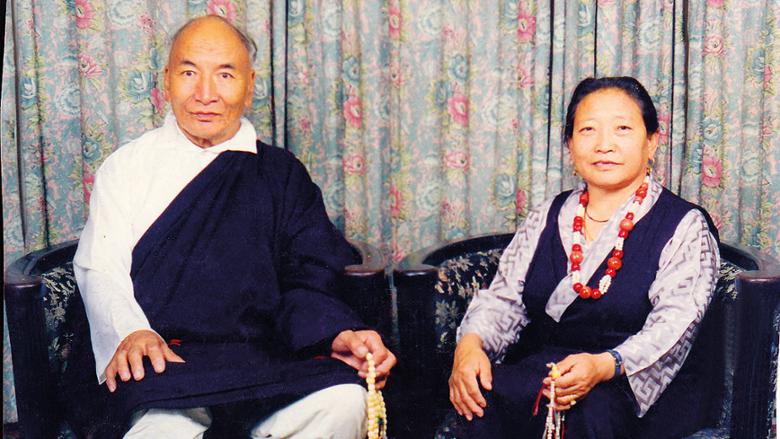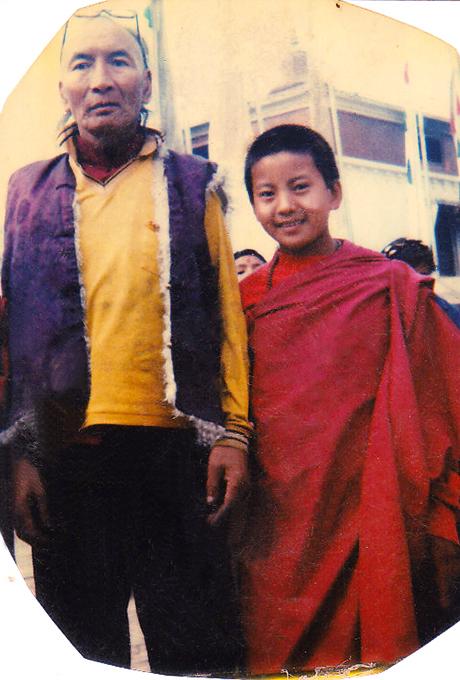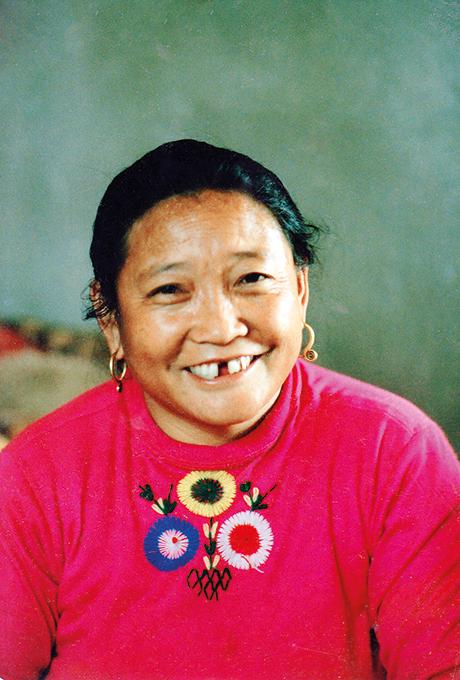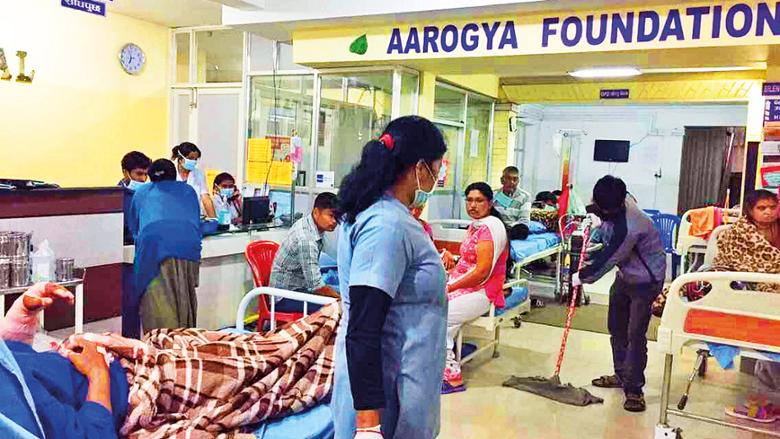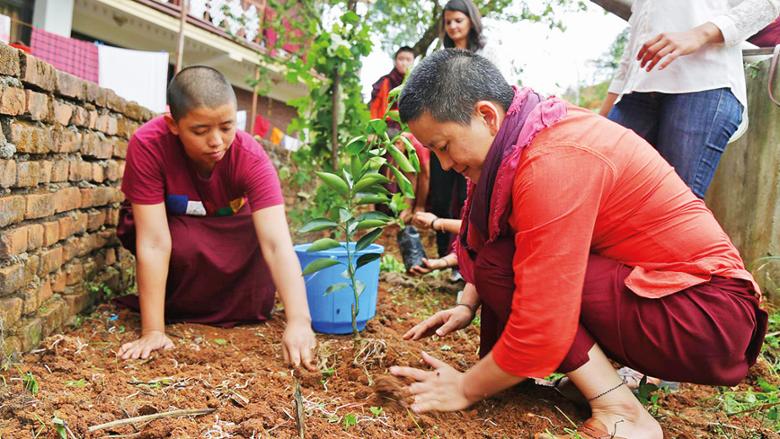Music icon, ‘controversial’ rebel, peacemaker: Nepal’s ‘singing nun’ has a wide repertoire
Ani Choying Drolma, the singing nun from Nepal who was in Dubai for an event recently, tells Anand Raj OK why she escaped from her family to join a monastery, what it was like to sing with AR Rahman, and why it’s important to view an issue from different perspectives
Ani Choying Drolma didn’t notice her father coming up behind her. Barely six years old at the time, she was playing with her friends in the yard outside her home in Bodhnath, Nepal, when the inebriated man approached her. Furious to see her playing and not doing chores, he grabbed a handful of her hair, pulled her up like a rag doll and began dragging her indoors. Trembling with pain, and pleading him to spare her, she tried to hold his legs, but he kicked her, sending her sprawling in the dust.
‘I’m not done. I’m stepping out,’ he growled, but warned Choying that ‘I will punish you when I return.’
[It's not money or health — the secret to live longer is a happy life partner]
Choying knew that the longer the time between the perceived mistake she made and the time he punished her, the more severe would be the beating she received.
Later that night when he returned home, little Choying prayed that he would have forgotten the incident. Hoping that he would pardon her if she owned up and reminded him, she softly told him ‘Dad, I think you’ve forgotten something…’
The man stared at her, rage burning in his eyes, then hurled a knife that he was sharpening in his workshop at her. The handle missed her eye but hit her forehead. Mad at having missed her eye, he threw a chisel at her before getting up, picking up a stick and beating her – on her head, back and limbs. The little girl bit down on a blanket to muffle her sobs, knowing well that her cries would only encourage him to beat her more severely. Several minutes later, he stopped when he grew tired, and fell asleep.
That wasn’t the only time Choying’s father beat her, and to be fair, she was not the only victim of his assault; he would beat her mother too almost daily. One time he hit the little girl on the head with a sharp-edged metal pot for a minor mistake she made, almost splitting her skull and leaving her with a nasty gash.
‘A warm liquid gently flows over my skull and I sink into a semi-consciousness... as though I am floating,’ she writes in her autobiography Singing for Freedom, recalling that horrific incident.
***
More than four decades later, Choying Drolma, now 49 years old, is seated next to me on a white, soft, comfortable sofa on the lawns of the Caesars Palace Bluewaters Dubai overlooking the Arabian Sea. Dressed in the deep ochre robes of a Buddhist nun, a couple of days’ growth of hair on her perfectly round head, the calm and serene-looking Nepalese woman has a beatific smile as she admires the blue waters.
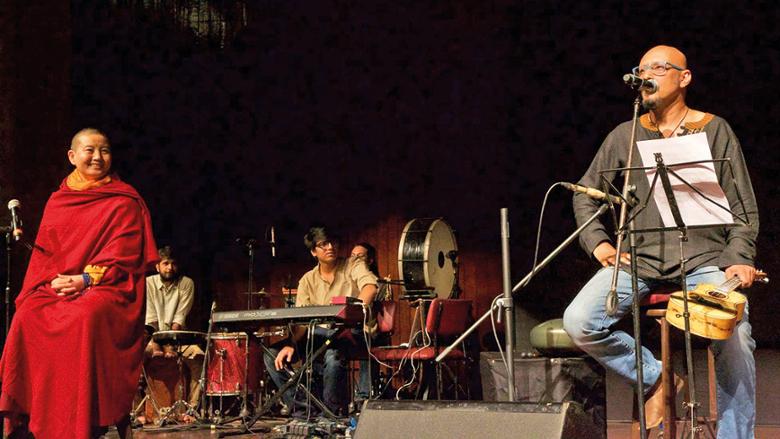
‘I still bear that injury mark on my head,’ she says with a smile, gently caressing her pate, when I ask her whether it was easy for her to come to terms with the pain she suffered at her father’s hands. ‘But what I don’t bear is any ill-will towards my father, who passed on some years ago. It’s pointless to carry anger and hatred in your heart.’
Her tone carries no anger, rancour or vengeance. Instead, her calm smiling face bears an overwhelming sense of tranquillity and of peace. Choying clearly has reconciled with all that has happened in her life and holds no grudge against her father. ‘There were two men I loved – my master [in my monastery] and my father,’ she says.
Choying would go on to tell me how she came to accept – and even love – her father. But more on that later.
For those who came in late, Choying is not just another Buddhist nun from Nepal. A Unicef goodwill ambassador, she is also one of the biggest pop stars in her Himalayan country – and overseas – having cut some 15 albums of soothing Nepali melodies and Tibetan hymns that celebrate peace, harmony, love and compassion.
In Dubai to perform at Unmask UAE, an event organised by the UAE chapter of Entrepreneur’s Organization – a global network of more than 14,000 members across 60 countries and 193 chapters, including 90 members in the UAE chapter – Choying regaled the audience with some soul-stirring melodies that were at once soothing and serene, and which highlighted messages of tolerance, love and peace.
Popularly known as the ‘singing nun’, Choying, whose fans include Tina Turner (she is going to record a song with Tina soon), Tracy Chapman and Bonnie Raitt, goes on world tours regularly, performing in the US, Brazil, China, Singapore, Russia, India and France, among others. She has also performed at the UN headquarters in New York.
That said, one of her music career highlights, she admits, was being invited by Oscar-winning musician AR Rahman to record a song in Mumbai three years ago. ‘I’m truly a big fan of Mr Rahman,’ says the celebrity nun, with a laugh. An unabashed lover of Bollywood films and music, she remembers racing off regularly to local cinemas in Bodhnath to catch the latest popular Hindi movie while growing up in Nepal.
So when out of the blue, one day in 2016, she received a call from the music maestro’s office in Chennai, India, inviting her to record a song for music programme MTV Coke Studio, ‘it was a dream come true,’ she says, her eyes twinkling as she reminisces the moment. ‘I was so nervous and excited I didn’t know what to say.’
But when Rahman’s team mentioned the date of the recording, her heart fell – it was on the same day she was to be performing in Indonesia. ‘I told them that I was very sorry but wouldn’t be able to make it as I had committed to the Indonesia gig.’
So when would you be available, they asked. ‘I couldn’t believe my ears,’ she recalls. ‘I was overjoyed. I said I can come the very next day after the concert in Indonesia.’
Choying flew directly from Bali to Chennai to record Zariya.
Besides having soothing undertones of Choying’s Buddhist hymns, the song is overlaid by a traditional Jordanian melody by Farah Siraj, and with the additional voice of Rahman, the number gives the term global music a new spin. To date, the video has racked up over 2.8 million views.
‘Working with Mr Rahman was a beautiful experience,’ she says. ‘To be singing with the person you’ve been admiring all along was mesmerising. He has great respect for musicians and is also a man with deep spiritual values.’
Did she always love music?
‘From the time I was a kid, I enjoyed listening to – and singing – Bollywood and Nepali songs,’ says the nun who has won several awards for both her music and her humanitarian efforts. ‘Singing and dancing were what made me happy; it helped me forget – at least for some time – the pain of the daily beatings.’ But her family did little to encourage the girl’s flair for music.
Choying’s vocal talents were taken seriously when she was in the Nagi Gompa monastery. However, music among the monks had an undertone different from that perceived popularly. ‘Music in the monastery was encouraged only to enhance or cultivate the spiritual ability within yourself,’ she says. ‘It was not [as a stepping stone to becoming] a musician or a singer or for any commercial purpose.’
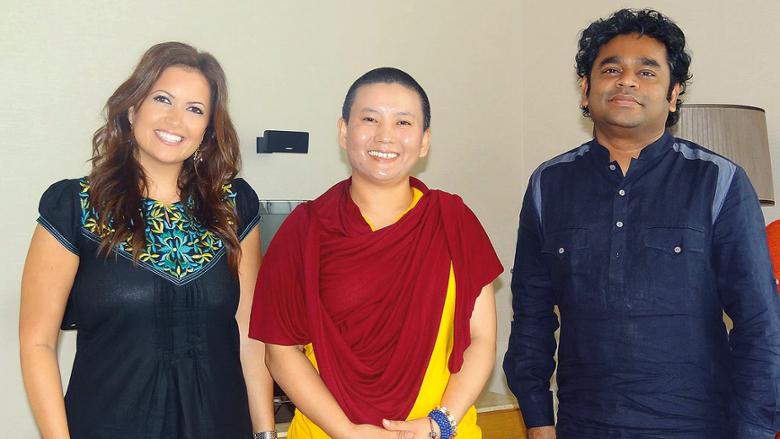
But fortunately for her, guitarist and composer Steve Tibbetts overheard her singing while he was visiting the monastery in the 90s. Recognising her talent, the American musician recorded a couple of her songs and sent them off to Joe Boyd seeking his comments. A legendary music producer, Joe, who has worked on the recordings of the likes of Pink Floyd and R.E.M., was impressed and gave Steve the thumbs-up to record more music with Choying.
The result was Cho, Choying’s first music album in 1997.
A year later the nun and two other members from her congregation went on a concert tour of the US.
Today, two decades later, the Buddhist nun’s schedule is packed, with the in-demand singer touring with her band nearly six months of a year.
‘Whenever I sing, I am in a meditative state of mind – a state where you are free from hope and fear,’ says Choying, a picture of placidness. ‘You are totally unmasked. You are not afraid of being criticised. It’s the natural stage of mind – a period when you are totally calm.’

She may have been calm while singing, but there have been occasions when excitement has got the better of her – like the time she met pop singer Bonnie Raitt the first time.
‘Ahh, that was in 2004,’ she says, giggling like a schoolgirl remembering the moment. ‘I first heard Bonnie when I was a kid. Somebody gave me a music cassette of her songs and I remember I loved it.’
In 2004, when Choying was performing in San Francisco, she saw a woman with flaming red hair in the audience, and the nun was sure it was Bonnie Raitt. ‘I told myself “she does look like Bonnie Raitt’’,’ recalls Choying. ‘But I didn’t expect her to come to my concert. Then, after the show as I was leaving she walked up to me and said, “hi, I’m Bonnie and one of your biggest fans”. I looked at her and said “Are you kidding? I am your fan”. It was such an amazing, exciting moment for me. She actually had her entire band fly in from Las Vegas to San Francisco to attend my concert. That was so special – meeting a childhood favourite.’
But Choying is busy not just on stage. She and her team of nuns support around a dozen charities through her Nun’s Welfare Foundation and run a kidney hospital that offers medical aid to people with renal conditions. ‘I lost my mother to kidney conditions,’ she says.’ I tried a lot but couldn’t save her.’
Much of the funds she raises through CD sales and from singing is channelled to these charities, she says.
Choying has also set up the Arya Tara School in Kathmandu, offering girls aged five to 18 lessons in not just the Buddhist scriptures but also in math, sciences and computers skills. Many of the girls are also given financial assistance to go to college.
The move to the monastery
But we are racing ahead. Keen to know why a music, film and dance-loving person like her would choose to join a religious order, I ask Choying what made her opt for the life of a Buddhist nun in a monastery.
She is silent for a moment, as though collecting her thoughts. ‘I – like many women – suffered a lot of gender discrimination,’ she says. ‘And I always felt it was not right. It was unfair.’ Girls, she says, were not encouraged to attend school. Even when it came to food, girl children were discriminated against. ‘Parents treat their sons so much better than their daughters – something that upsets me no end.’ It also made her a rebel of sorts, seething with negativity and regularly picking fights with those who were being unfair or unjust to others.
Then there was the domestic violence. ‘It’s a common feature in most homes. My father used to beat me and my mum mercilessly. But the emotional pain that I underwent was greater than the physical torture,’ says Choying, whose autobiography Singing for Freedom has been translated into 15 languages.
Seeing her mother being brutally assaulted almost every day scarred Choying so severely during her growing years that she vowed never to get married. ‘I was sure the man I married would also treat me the way my father was treating my mother. But I also knew that soon I’d be forced to get married, maybe to a man much older to me. That was scary. That fear was unbearable. There were times I felt like running away from home.’
Then one day, when she was around 10 years old, her mother, after enduring a severe beating from her father, gave her an option Choying can’t thank her enough for. ‘Wiping her tears on her sleeve, my mother hugged me close to her breast and told me ‘Pomo’ – that was my pet name – ‘Pomo’, she said, ‘you shouldn’t get married if you don’t want to.’
Choying couldn’t believe her ears.
‘But what do I do?’ she asked her mother. ‘My mother gave me an option: She told me, “Why don’t you become a nun?”’
Choying pauses to sip water from a small bottle she is carrying. The seraphic smile never leaves her face even as she is recounting her harrowing childhood.
‘I didn’t need any more reasons to become a nun. I became a nun only to escape the torture and unpleasant environment that I was growing up in. Then later, of course, I realised what it is to be a nun.’
And what is it to be a nun? I ask.
‘The best thing is that you escape the violent environment and have a refuge where it’s so full of compassion and kindness. This is also the place I found a guru.’
She credits her mentor – Tulku Urgyen Rinpoche – for helping calm her down and eliminate the negativity from her system. ‘He helped me get over my anger,’ she says. ‘Although I still am a bit hard-headed when it comes to some things.’ She laughs heartily.
So, were you a rebel, a revolutionary? I ask, alluding to the fact that Choying is one of the few nuns who owns and drives a car in Nepal and lives a seemingly and relatively comfortable life.
‘Controversial is perhaps a better word. Revolutionary sounds more respectful; controversial is probably what some people would agree with,’ she says, her face crinkling as she laughs gently.
‘The violence you experience can develop violence in you. The anger and negativity that was within me was burning me up and making me a very unhappy child. My teacher understood that and he handled me with a lot of love, care and compassion. He slowly pacified my anger and helped me develop the right perspective to view all that I had gone through, all the negative experiences I had when growing up, in such a way that it wouldn’t destroy me but actually help me grow.’ (see below)
But how did she reconcile with her father beating her almost every day?
‘I used to feel tortured. A lot,’ she admits. ‘I felt my father hated me.’ It was her mentor who helped her develop a positive attitude towards her father. ‘He asked me, “Do you think your father really enjoyed beating you?” That set me thinking. I remembered that whenever he beat me or my mother, he was never happy afterwards.’
Her teacher then asked her to think of one good quality her father had. ‘I said he used to work really hard to make sure everyone in the family was well fed. That helped me feel a little lighter. I then started to dig deeper into my own mind to find out other good qualities of my father and that process slowly calmed me. I realised the hardships he was going through to care for the family and even began to feel sorry for him.
‘Slowly we began to fall in love with each other again.
‘By the time he passed away, the equations changed and I began to view him as my child and he saw me as his carer.
‘The last words he spoke before he breathed his last, were “Thank you, Choying. I am blessed to have a daughter like you”.’
Tips from Choying to rein in anger and be kind
• The first thing that happens when you are angry is that you harm yourself, and then people around you. Why would you ever want to hurt yourself? Learn to control anger. Meditation is the best remedy. It helps you become calm, and removes negativity from your life.
• Put yourself in others’ shoes and view things from their perspective. Introspection is very important..
• A better perception is all about changing your view towards something that has happened – how you are judging your experiences. It helps to have a positive outlook in life; cultivate the ability to see the best even in the worst. We all have that potential in us; it only needs to be cultivated.
• I am not highly educated or highly realised but the simple thing I use in my life is to be kind; whether that is through a very sincere smile to someone or saying a nice word with a joyful heart. I never try to be miserly with my love or kindness.
• Learn to find joy and happiness in others’ happiness. Just as you rejoice when your child is doing well, learn to rejoice in others’ happiness.
Sustainability in events
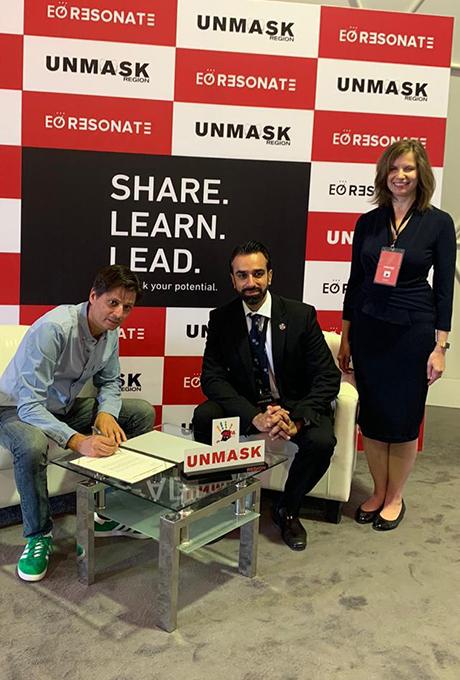
Entrepreneurs Organisation (EO) UAE has joined hands with the United Nations Global Compact to maintain its commitment to the sustainability of all its events. By joining the Compact, EO UAE becomes part of the largest corporate sustainability initiative in the world, committing itself to align its operations with the Ten Principles of the United Nations Global Compact.
